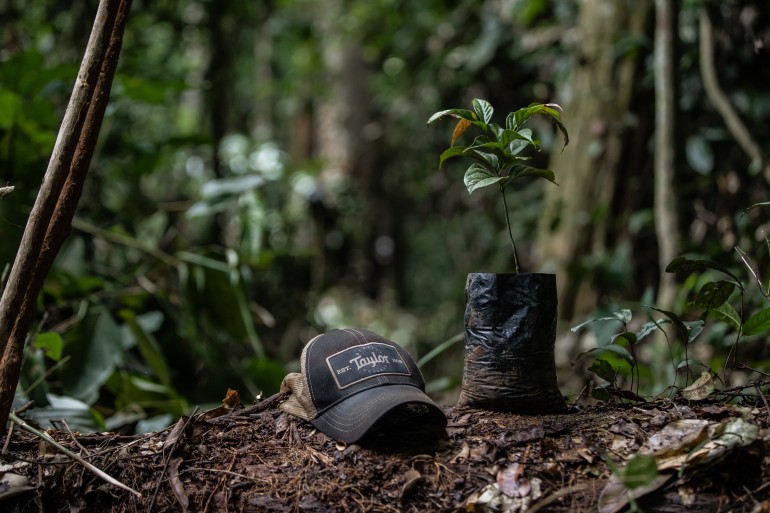

20.06.2025
In 2024, the Ebony Project, coordinated by the Congo Basin Institute (CBI) in Cameroon, continued to advance its unique approach that combines scientific research, community engagement, and forest landscape restoration. Supported by key partners including Taylor Guitars, the Franklinia Foundation, the Global Environment Facility (GEF), and the University of California, Los Angeles (UCLA), the project is cultivating a model that blends ebony tree planting, agroforestry, and rural development.

65,700 Trees Planted: A Major Milestone
In 2024, the project planted 4,700 ebony trees and 8,100 native fruit trees, across 13 partner communities in Cameroon raising the project's total to 65,700 trees planted. These results stem from a strong grassroots model that includes technical support, progressive scaling, and peer-to-peer community motivation.
Initially envisioned as a side benefit, the inclusion of fruit trees has become a core component of the project—enhancing food security and providing new income opportunities. With growing yields, communities may soon access regional markets for non-timber forest products like bush mango or avocado.
Gender Inclusion
Thanks to its partnership with GEF, the Ebony Project launched its first gender strategy in 2023. Since then, women have represented nearly 40% of new tree planters. Measures such as forming dedicated women’s groups, assigning female nursery managers, and gathering disaggregated data have contributed to this shift.
Research, Biodiversity and New Tree Species
Although ebony (Diospyros crassiflora) remains the emblematic species, the project is now fostering research and propagation of additional native trees such as moabi (Baillonella toxisperma) and mukulungu (Autranella congolensis), both listed as threatened. New partnerships have deepened insights into pollination, regeneration, and growth for these and other species like Coula edulis or okan.
The Ebony Project has also begun collaborating with scientists to explore how forest elephants contribute to ebony seed dispersal—highlighting broader ecosystem interconnections.
A Hybrid Model of Tree Planting and Restoration
Rather than reforesting untouched landscapes, the project operates in a dynamic agroforestry zone. With 16 tree species (11 native) planted in cocoa fields and food crop plots, it embodies a balance between ecological restoration and livelihood support. These mixed systems deliver functional and taxonomic diversity, even if full canopy forest recovery is not the aim.
Scaling Up and Securing Long-Term Funding
Now in its ninth year, the Ebony Project has evolved far beyond its original scope. While Bob Taylor (co-founder of Taylor Guitars) remains a key benefactor—contributing up to $350,000 annually—the project acknowledges that new funding mechanisms are essential to scale sustainably and expand into neighboring countries.
Support from the GEF (GEF7 and future GEF8) and Franklinia Foundation extends through 2033. Meanwhile, outreach to other private actors—including instrument makers and forest operators—is underway.
To Learn More
ATIBT channel on YouTube
ATIBT channel on YouTube